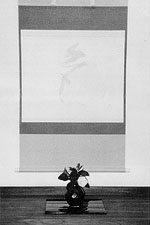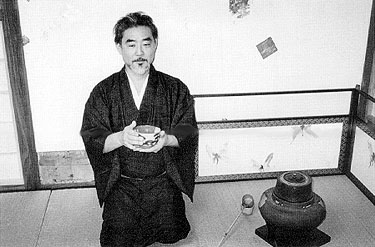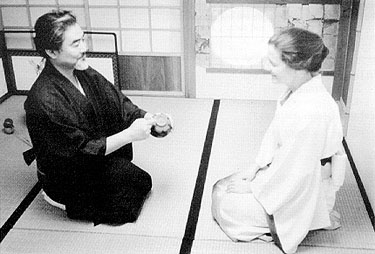
|

|
|
40 St. Stephen St. Boston, MA (617) 247-1719 Tea served on Sunday only, 4-6 pm. Tea ceremony: $22 Reservations required. |

|
| Click here for reviews of the Kaji Aso Japanese Tea House. |
|
To participate in the tea ceremony there are no stressful rules. You come into the room next to the tea house and wait until you are invited in. After you are invited, you come into the tea house and kneel down. You give a light greeting to the host. To your left side you will see the "Tokono-ma" where the art piece for that day is hanging. You sit in front of the art piece and enjoy it a moment. Then you will be guided to your seat. You may enjoy conversation during the tea ceremony, except when the host is preparing tea. The subjects of conversation should be concerned with the harmony of the people who are attending the tea. After all, there is no difficulty in tea ceremony, but only enjoyment.
In China, prior to 1000 B.C., someone discovered the good taste of tea as well as its health benefits. Since the discovery of the tea tree, tea has been taken as a very important beverage or medicine. Especially after distinctive religions such as Buddhism were established, tea started to be used by people who practice meditation to keep their minds clear and to maintain good health. However, the tea ceremony which presents tea in a more artistic aspect, not just as a beverage, came at a much later time. Eisai is the name of the monk who brought back to Japan the good seed of tea with Zen Buddhism in the 13th century. So, naturally tea ceremony was formed with a Zen Buddhism base. Today's most common form of tea ceremony was established in the 16th century, which is not only influenced by Zen Buddhism, but also includes Japan's distinctive culture. For instance, the "Noh Play" started to become a part of the tea ceremony. Even later Confucianism got into the tea ceremony. Currently, the tea ceremony is a place where all human cultural intentions can meet. Simply, the purpose of the tea ceremony from the beginning to the end is to appreciate tea. Yet, in between there is a countless arrangement of ingredients. Tea is ... to enjoy its taste. Tea is ... the place where man's spirit and spirit are unified. Tea is ... the place where art and humanism exist together. Tea is ... the discovery of life, beauty, and peace. Tea is ... very old and very young. Tea is ... not ruled, but having tea will show you a natural way to follow by not asking you to behave anyway in particular, but to make tea better. Tea ceremony is really a multi-media art form that intends to harmonize human beings and their life. |
|
BIOGRAPHIES OF TEA CEREMONY MASTER AND ASSISTANT Mr. Kaji AsoMr. Kaji Aso has had various experiences of tea ceremony school in Japan. He is seeking the most original and ancient form of tea ceremony. At Kaji Aso Studio, apprentices are doing all the basic research and exercise of tea ceremony, including the making of tools and pastries. So, for Mr. Aso, tea ceremony is not the typical tea school type of tea ceremony. Instead, he tries to adopt the true tradition of tea, which means the true enjoyment of tea and the true enjoyment of friendship through sharing a sip of tea with people. Ms. Kate Finnegan Ms. Kate Finnegan has studied Japanese tea ceremony once a week, under the direction of Mr. Aso, for the past eleven years. She has been in Japan three times and has done her own research of tea as well. Her vision of tea is not just the adaptation of a certain style, but has a more wide understanding of life and nature, as her master believes as well. |

|
SCHEDULE FOR TEA CEREMONY Tea Ceremony is every Sunday 4-6 pm. Price per person is $22. Reservations are required 24 hours in advance. Dress should be neat and clean. No jeans please. Group rates and private tea ceremonies available by appointment. Call for information. ENJOY TEA CEREMONY WITH KAI-SEKI DINNER The complete experience of tea ceremony is with dinner and tea, called Kai-seki. Exquisite seasonal dishes are served. 4-8 people. Call for information and reservations. APPRENTICESHIPS AVAILABLE ...for people who would like to study the tea ceremony more in-depth, including the process of preparing and making the tea. Sundays 2-7 pm. $250/8 wks. |


